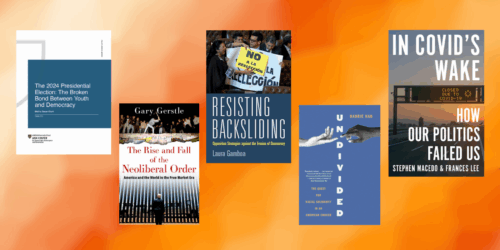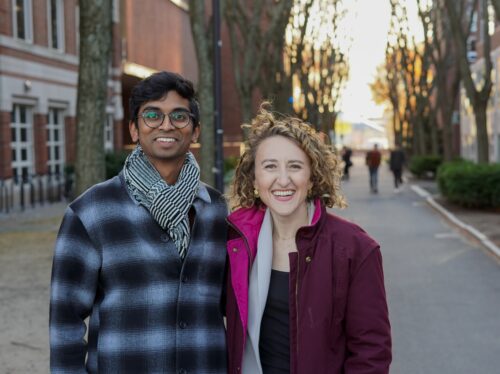Never in American history has a party shifted course as quickly and effectively as the Democratic Party did this summer. In a matter of days, Joe Biden was out, and Kamala Harris was in, and the party coalesced around their new candidate with a rarely seen enthusiasm and unity. The rapid transition left many wondering: Was this process truly democratic?
This question was at the crux of a recent Ash Center panel, the inaugural event of the Candid and Constructive Conversations series, which provides HKS students, staff, and faculty with opportunities to learn and practice constructive disagreement to support the robust exchange of ideas. Moderator Archon Fung, director of the Ash Center for Democratic Governance and Innovation, and Winthrop Laflin McCormack Professor of Citizenship and Self-Government, began by highlighting that the Democratic Party bills itself as “the party that is standing up for democracy.” Yet, Fung continued, Biden originally secured his position through a largely uncontested primary and was later replaced by Harris without consideration of alternative candidates or ratification from party members or the broader public.
In the words of one of Fung’s less politically inclined friends, “It’s as if Harris was stuck at level 3 of a video game and then she got a cheat code that hopped her up to level 9.” Fung posed the question, “Many ‘capital D’ Democrats seemed thrilled with this choice, but how should Americans, as ‘small-d’ democrats, regard these surprising—and I daresay norm-breaking—turns? Looking forward, should the selection of party leaders be more ‘small-d’ democratic or not?” Though many of these events have already happened, Fung emphasized that there’s never a “good time” for these dialogues; it’s about making space for difficult conversations that allow for better results in the future.
The panelists debated the nuances of the process, beginning with whether additional candidates should have run against Biden in the Democratic primary. “Maybe,” said Elaine Kamarck, senior fellow in governance studies and the director of the Brookings Institute’s Center for Effective Public Management. “But no one did. And you can’t force people to run for president.” She noted that while the lack of competition may have appeared undemocratic, it was the result of political norms, not institutional barriers.
“We should not ignore the elephant in the room,” added Larry Lessig, Roy L. Furman Professor of Law and Leadership at Harvard Law School. “This, for most Democrats, is an existential election, and nobody wanted to do anything that would threaten the ultimate result of the election.”
Dan Schlozman, Joseph and Bertha Bernstein Associate Professor and director of graduate studies at Johns Hopkins, questioned whether Biden should have run in the first place. He argued that Biden’s decision to pursue reelection, despite his increasing age and waning popularity, may not have served the long-term interests of the Democratic Party. “He should have retired a champ,” he said. “And yes, I think that should have happened and that we would have been a better party to have had a full process to determine the nominee rather than what I regard as a totally legitimate but abbreviated process this summer.”
Fung highlighted the structural tension within the party, where anyone can technically run but there’s a strong deference to incumbents. “It does seem dysfunctional from a competitive perspective and probably from a normative, ‘small-d’ democratic perspective,” he said, questioning whether the practice undermines democratic principles in the party even if it follows formal rules.
“I do think we should learn a lesson from this experience about the relative power of the democratic party over its own nominee,” said Lessig. He noted that the polling showed that Biden wasn’t as strong as in the last election, “and yet because the president controls the party it was hard to structure something that could even raise that question.”
The panel agreed that the situation was highly unusual, given the time constraints, making a competitive process difficult to implement. Still, Lessig urged the adoption of new ideas and technologies in the form of virtual deliberative citizen assemblies. “This is a moment where we should think about democratic innovation in a really aggressive way,” he stressed.
Kamarck defended the legitimacy of the current nomination process, noting that delegates ultimately choose the party and platform—and they are elected. “Every single person who voted for Kamala Harris in Chicago was elected by Democrats … I don’t think there is a real legitimacy problem here unless you have a legitimacy problem with representative democracy in the first place.”
While Lessig agreed that “they had the power to make the decision,” he pushed back on the idea that the current system is acceptable as is, asking what can be done to address people’s lack of faith in our party systems. He asked, “In recognizing skepticism, cynicism, about the political process—and especially about political process inside of parties—what could we be adding to the process that gives people additional reason to have confidence in the outcome?”






